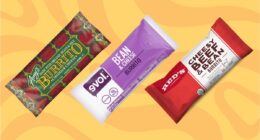Whether you’re a competitive athlete or a weekend warrior, getting results from your workouts comes down to way more than just the work you put in at the gym. In fact, combining a nutritious diet with a few top supplements for athletes can help give you a serious edge over your competitors while upgrading your performance by increasing strength, metabolism and muscle mass so you can make the most of each gym session.
Ready to learn more? Here are some of the top fitness supplements to consider adding to your routine, plus what to look for on your next shopping trip to make sure you’re getting the real deal.
Best Supplements for Athletes
1. Collagen
Collagen is the most abundant protein in the body and is found throughout the bones, muscles, skin, ligaments and tendons.
Unfortunately, as we get older, the amount of collagen that our body produces starts to decline, resulting in symptoms like joint pain, skin problems and slower healing and recovery.
Supplementing with collagen is a great way to combat the natural signs of aging and bump up collagen levels in your body to get quicker results.
Studies show that collagen can relieve joint pain and increase bone mineral density, which may help protect against exercise-related damage to keep your body strong. It can also improve your body composition by increasing lean body mass, building muscle strength and reducing overall fat mass.
What’s more, research also shows that collagen can even help enhance heart health by decreasing arterial stiffness and increasing levels of beneficial HDL cholesterol in the body, allowing your heart to pump blood through the body more efficiently to deliver key nutrients to your cells.
2. Whey protein
Without question, whey protein ranks as one of the most popular and most effective dietary supplements for athletes, and taking it as part of a post-workout meal or snack can help stimulate muscle synthesis to bring your workout routine to the next level.
Plus, it’s a good alternative to other supplements like protein tablets because it’s easy to add to shakes and smoothies and can provide a more concentrated dose of protein in every serving without having to swallow several capsules or pills at a time.
Impressively enough, research has found that whey protein can help maximize muscle growth and improve body composition by increasing lean body mass.
According to one large review of 14 studies in the Journal of the American College of Nutrition, combining resistance training with whey protein led to reductions in body weight and body fat, plus an increase in lean body mass.
(If you’re a vegan and seek muscle gain, consider pea protein as a great sport supplement. In fact, a 2015 study published in the Journal of the International Society of Sports Nutrition proved that pea protein was just as effective as dairy-based proteins at increasing muscle thickness after resistance training.)
3. Multivitamin
Regardless of what type of athlete you are, multivitamins are one of the most important sports supplements that you can add to your routine. Multivitamins can help round out a balanced diet, filling in the gaps to supply any essential nutrients you may be missing.
Certain nutrients are especially important for athletes, and a deficiency can take a major toll on your health. B vitamins, for instance, are responsible for supplying energy to your cells while vitamin C provides antioxidants that can help fight free radicals and promote muscle recovery.
Other key vitamins and minerals like calcium, magnesium, potassium, iron and zinc are also involved in energy metabolism, muscle function, blood cell formation and oxygen uptake, all of which are crucial to optimizing athletic performance.
(You can take each of the vitamins and minerals mentioned above as individual supplements as well, though a multivitamin should be able to cover all your bases in addition to a healthy diet.)
4. Vitamin D
With some sources estimating that a whopping 41.6 percent of the U.S. population is deficient in this essential micronutrient, vitamin D is one of the most important vitamin supplements for athletes on the market.
Vitamin D is found in few food sources and is synthesized by the skin as a result of sun exposure, but for older adults and those who are overweight, have darker skin or get limited sun exposure, the risk of deficiency gets even higher.
Not only does vitamin D work with other micronutrients to promote bone health and prevent bone loss, but it’s also involved in several other aspects of health as well. In fact, one review of seven studies even found that vitamin D supplementation was effective at increasing both upper and lower limb strength in healthy individuals over a period of four weeks to six months.
5. Omega-3 fatty acids
Omega-3 fatty acids are a type of heart-healthy fat that have been linked to a long list of potential health benefits. Besides improving heart health by keeping cholesterol levels in check, omega-3 fatty acids can also enhance immunity and soothe inflammation.
Omega-3 fatty acids may be especially beneficial for promoting healing, with some research suggesting that its anti-inflammatory effects may help prevent sports injuries in elite athletes and casual gym-goers alike.
Fatty fish varieties like salmon and tuna fish are great natural sources of omega-3 fatty acids, but fish oil is also available in supplement form for a quick and convenient way to get your fatty acid fix each day. There are also several omega-3 supplements for vegan athletes as well, such as algal oil, which is derived from omega-3-rich algae.
6. Glutamine
Glutamine is an incredibly important amino acid that is frequently considered one of the best supplements for endurance athletes. It’s been shown to promote healthy healing and is also used to provide energy for the cells in the immune system.
Plus, a study conducted by the Division of Kinesiology at Dalhousie University found that supplementing with glutamine reduced muscle soreness and helped speed up recovery post-exercise.
Coupled with its healing, immune-boosting properties, glutamine is a must-have if you find that you suffer from frequent aches and pains following your high-intensity workouts.
7. Bone broth
Made by slow-simmering animal bones and connective tissue for a period of several days, bone broth is loaded with easy-to-absorb trace minerals and ample amounts of collagen and gelatin.
As one of the best joint supplements for athletes, the collagen found in protein powder made from bone broth has been shown to improve activity-related joint pain in athletes while also protecting and preserving overall joint health.
Each serving of bone broth also delivers a hefty chunk of protein, making it a great alternative to other protein powders and securing it a slot as one of the best dietary supplements you can incorporate in your routine.
In fact, high-protein diets have been shown to help boost metabolism, improve body composition and even encourage muscle growth.
8. Creatine
Creatine, also referred to as creatine monohydrate, is one of the best bodybuilding supplements for those looking to build strength and increase muscle mass fast.
According to a review published by Baylor University, over 500 studies have been conducted on the effects of creatine supplementation, with about 70 percent demonstrating that creatine has significant ergogenic properties, meaning it can help boost performance, stamina and recovery.
Although there are plenty of comparisons out there between creatine vs. whey, both can be used in conjunction to really kick up your workout.
While whey protein helps stimulate muscle synthesis and growth, creatine helps boost strength and power to help you get better results, making it one of the top supplements for CrossFit athletes and bodybuilders alike.
9. Turkesterone
Turkesterone is a concentrated type of ecdysteroid (also called a phytoecdysteroid), a compound that is naturally found in some insects and plants. Ecdysteroids have anabolic and adaptogenic effects, so they’re isolated and used to make supplements that are taken for purposes such as to boost muscle growth and athletic performance.
There’s evidence that turkesterone can help increase muscle growth and one’s muscle-to-fat ratio, thereby improving body composition. It may also have some anti-obesity and metabolic-boosting effects, according to certain animal studies.
Some other good supplements for athletes to take include:
Benefits of Sport Supplements
A healthy diet is fundamental to athletic performance and can often supply all of the vitamins, minerals and antioxidants that your body needs to succeed, whatever your sport or physical activity of choice may be.
However, adding a few nutritional supplements for athletes into the mix can bring your strength and stamina to the next level, supplying extra micronutrients that you may be lacking or that you can’t get from food sources alone.
Not only can adding a few safe supplements for teenage athletes and adults help round out your diet and provide an added dose of vitamins and minerals, but several supplements have also been shown to have extra benefits as well.
Creatine, for example, is one of the best supplements for muscle gain and strength, and while it’s found in plenty of foods like red meat, poultry and fish, opting for a supplement instead can supply a higher amount of creatine for faster results.
Similarly, collagen is found in very few food sources but has been shown to help reduce joint pain, improve body composition and increase muscle strength, making it one of the best workout supplements for men and women alike.
Although the benefits can vary based on which supplements you take, the top supplements for athletes are generally used to:
Where to Find and How to Buy
You can easily find most of these supplements at pharmacies, grocery stores, health food shops and online retailers, making it easy and effortless to start adding them into your routine.
Be sure to always buy from a trusted and reputable retailer, and look for supplements with minimal extra ingredients and no added fillers to ensure you’re getting the best quality possible.
There are plenty of resources available that evaluate the quality of specific supplements and brands, using independent, third-party testing to determine how different products measure up to their claims. These companies make it easy to make sure you’re getting the most bang for your buck, helping you pick the best energy supplements and performance-enhancers available.
High-Quality Sports Supplements vs. Low-Quality Sports Supplements
Unfortunately, all supplements are not created equal, and many companies prefer to pump their products full of fillers and additives in favor of profit rather than health.
So how can you be sure you’re getting the best quality possible, regardless of whether you’re purchasing protein supplements for teenage athletes or professional competitors?
Here are a few simple tips for picking the best supplements for men and women:
- Buy from a reputable and reliable retailer: Purchasing from a company that has a history of producing high-quality products is one sure-fire way to ensure you’re getting the real deal.
- Read the ingredients label, and look out for additives and extra ingredients: Products that are chock-full of added ingredients and fillers can be a red flag, indicating that you may not really be getting what you’re paying for.
- Check other resources for third-party testing and reviews: Look for independent companies like Consumer Labs that evaluate the quality of products and offer advice on which brands can be trusted.
- Remember that cheaper is not always better: If a product is half the price of other comparable products, there may be a good reason why. A higher price tag can often signify higher quality standards, meaning you’ll be getting a better product overall.
How to Use
Remember that supplements are just one piece of the puzzle, which is why it’s incredibly important to incorporate them into a healthy diet and lifestyle rather than expecting supplements to be a quick-fix for better performance and faster results.
Additionally, it’s definitely possible to go overboard and have too much of a good thing. Multivitamins, for example, don’t become more effective by doubling or tripling the dose and can actually be dangerous if consumed in high amounts above the upper limit for specific vitamins and minerals.
Meanwhile, adding whey protein to a post-workout smoothie can be an effective way to boost muscle growth, but drinking several protein shakes per day without making other changes to your diet can actually cause weight gain and is often used as one of the most popular weight gain supplements for teenage athletes.
For this reason, it’s absolutely essential to stick to the recommended dosage when taking any kind of sports supplement. Follow the manufacturer’s instructions as directed, and be sure to consult with your doctor if you experience any adverse side effects or have concerns about your dosage.
Sports supplements should be used to supplement a healthy and balanced diet. When used correctly, they can bring a host of health benefits and help enhance your performance both in the gym and on the field.
Start by adding vitamin and mineral supplements to your morning routine and consuming with breakfast to help maximize absorption. Protein powders like collagen, bone broth or whey protein can be enjoyed as part of a post-workout snack or smoothie directly after exercising to enhance muscle growth and aid in recovery.
Meanwhile, studies suggest that creatine should be taken following exercise to have the maximum effect on strength and body composition.
Pair these elite athlete supplements with some of the best pre-workout foods to really drive up health and athletic performance. Foods like coconut oil, spinach, cordyceps, berries, coconut water, beets and chia seeds can help amp up energy, keep your body replenished and act as natural recovery supplements for athletes.
Looking for a few creative new ways to add a few exercise and bodybuilding supplements into your regimen? Many powdered supplements like collagen, bone broth and whey can easily be swapped into your favorite recipes to give them a high-protein, healthy twist.
Here are a few ideas to get you going:
Risks and Side Effects
Athletes have long used diet and supplements to help increase strength, stamina and performance. In fact, as far back as ancient Greece, athletes were advised to consume exotic meats and wine in the hopes of gaining an advantage over their opponents.
In the early 1900s, circus athlete Eugen Sandow emerged as the “father of modern bodybuilding” and began teaching how to use certain exercise methods and dietary habits to build muscle, with other bodybuilders soon following suit and recommending the use of ingredients like beef extract to help speed up muscle recovery.
By the 1950s, bodybuilding supplements and protein powders began popping up on the market, hitting a peak just 20–30 years later as the supplement industry began booming. The industry experienced even more growth with the signing of the Dietary Supplement Health and Education Act of 1994, which mandated that manufacturers were responsible for determining the safety of their products rather than the government.
In recent years, more and more research has demonstrated just how beneficial sports supplements can be when it comes to enhancing performance and increasing strength and muscle. However, it has also become increasingly difficult for consumers to find high-quality sports supplements to help maximize effectiveness.
With all supplements, be sure to buy from a trusted retailer and follow the manufacturer’s directions closely to avoid unwanted side effects. Consuming amounts above the recommended dosage can increase the risk of negative symptoms and may actually hurt rather than help athletic performance.
Check the ingredients label of your supplements carefully to ensure they meet the criteria to qualify as clean supplements for athletes.
Different regulatory agents have specific rules and restrictions determining which ingredients are considered legal supplements for athletes in different sports. Be sure to familiarize yourself with what is prohibited and allowed, and follow the guidelines carefully.
Finally, if you have any underlying health conditions or are taking any medications, check with your doctor before starting supplementation, as some supplements may worsen certain health conditions or interfere with specific medications.
If you have concerns or experience any negative side effects, talk to a trusted health care practitioner, and consider discontinuing use or decreasing your dosage.
Final Thoughts
- Sports supplements can be added to a nutritious diet and healthy lifestyle to help increase results and promote better performance.
- Supplements like collagen, bone broth protein, multivitamins, omega-3 fatty acids, whey protein, vitamin D and glutamine can all be effective at speeding up recovery, increasing muscle growth, improving body composition and more.
- Picking a high-quality supplement is key. Check the ingredients label, look for third-party certifications and buy from a trusted brand to make sure you’re getting the real deal.
- Most importantly, be sure to use these supplements for athletes as directed and pair with a healthy, well-rounded diet to maximize the potential benefits.





